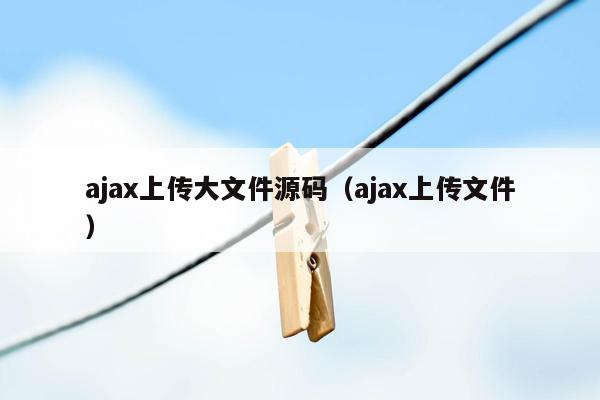ajax上传大文件源码(ajax上传文件)
本文目录一览:
- 1、用ajax上传最大就是20M,有什么办法可以控制上传文件的大小,传多大的文件都可以
- 2、PHP 如何用ajax做文件上传
- 3、怎么样通过jQuery Ajax实现上传文件
- 4、ajax+html实现文件上传有哪几种方法
- 5、如何用ajax上传文件
- 6、如何用Ajax实现多文件上传
用ajax上传最大就是20M,有什么办法可以控制上传文件的大小,传多大的文件都可以
这个要看你的ajax插件代码了,应该有个类似:maxFileSize的属性控制,找到这个属性值,改大点,或者把这个判断取消掉

PHP 如何用ajax做文件上传
通过传统的form表单提交的方式上传文件:
[html] view plain copy 在CODE上查看代码片派生到我的代码片form id= "uploadForm" action= "" method= "post" enctype ="multipart/form-data"
h1 测试通过Rest接口上传文件 /h1
p 指定文件名: input type ="text" name="filename" //p
p 上传文件: input type ="file" name="file" //p
p 关键字1: input type ="text" name="keyword" //p
p 关键字2: input type ="text" name="keyword" //p
p 关键字3: input type ="text" name="keyword" //p
input type ="submit" value="上传"/
/form
不过传统的form表单提交会导致页面刷新,但是在有些情况下,我们不希望页面被刷新,这种时候我们都是使用Ajax的方式进行请求的。
Ajax的方式进行请求:
[javascript] view plain copy 在CODE上查看代码片派生到我的代码片$.ajax({
url : "",type : "POST",
data : $( '#postForm').serialize(),
success : function(data) {
$( '#serverResponse').html(data);
},
error : function(data) {
$( '#serverResponse').html(data.status + " : " + data.statusText + " : " + data.responseText);}
});
通常我们提交(使用submit button)时,会把form中的所有表格元素的name与value组成一个queryString,提交到后台。这用jQuery的方法来说,就是serialize。
通过$('#postForm').serialize()可以对form表单进行序列化,从而将form表单中的所有参数传递到服务端。
但是上述方式,只能传递一般的参数,上传文件的文件流是无法被序列化并传递的。
不过如今主流浏览器都开始支持一个叫做FormData的对象,有了这个FormData,我们就可以轻松地使用Ajax方式进行文件上传了。
关于FormData及其用法
FormData是什么呢?我们来看看Mozilla上的介绍。
XMLHttpRequest Level 2添加了一个新的接口FormData.利用FormData对象,我们可以通过JavaScript用一些键值对来模拟一系列表单控件,我们还可以使用XMLHttpRequest的send()方法来异步的提交这个"表单".比起普通的ajax,使用FormData的最大优点就是我们可以异步上传一个二进制文件.
所有主流浏览器的较新版本都已经支持这个对象了,比如Chrome 7+、Firefox 4+、IE 10+、Opera 12+、Safari 5+。
参见:
FormData()
想得到一个FormData对象:
var formdata = new FormData();
W3c草案提供了三种方案来获取或修改FormData。
方案1:创建一个空的FormData对象,然后再用append方法逐个添加键值对:
var formdata = new FormData();
formdata.append("name", "呵呵");
formdata.append("url", "");方案2:取得form元素对象,将它作为参数传入FormData对象中!
var formobj = document.getElementById("form");var formdata = new FormData(formobj);
方案3:利用form元素对象的getFormData方法生成它!
var formobj = document.getElementById("form");var formdata = formobj.getFormData()
Method
FormData.append
本方法用于向已存在的键添加新的值,如该键不存在,新建之。
语法
formData.append(name, value);
formData.append(name, value, filename);
注: 通过 FormData.append()方法赋给字段的值若是数字会被自动转换为字符(字段的值可以是一个Blob对象,一个File对象,或者一个字符串,剩下其他类型的值都会被自动转换成字符串).
参数解释
name
键 (key), 对应表单域
value
表单域的值
filename (optional)
The filename reported to the server (a USVString), when a Blob or File is passed as the second parameter. The default filename for Blob objects is "blob".
FormData.delete
将一对键和值从 FormData 对象中删除。
formData.delete(username);
FormData.get
返回给定键的第一个值
formData.append('username', 'Justin');
formData.append('username', 'Chris');
formData.get(username); // "Justin"
FormData.getAll
返回给定键的所有值
formData.append('username', 'Justin');
formData.append('username', 'Chris');
formData.getAll(username); // ["Justin", "Chris"]
FormData.has
检查是否包含给定键,返回 true 或 false
formData.has(username);
FormData.set
设置给定键的值
formData.set(name, value);
formData.set(name, value, filename);
浏览器兼容情况
来自 MDN:
Desktop
FeatureChromeFirfox(Gecko)Intenet ExplorerOperaSafariBasic support7+4.0(2.0)10+12+5+
append with filename(Yes)22.0(22.0)???
delete, get, getAll, has, setBehind FlagNot supportedNot supported(Yes)Not supportedMobile
FeatureAndroidChrome AndroidFirfox Mobile (Gecko)Firfox OS (Gecko)IE MobileOpera MobileSafari MobileBasic support3.0?4.0(2.0)1.0.1?12+?
append with filename??22.0(22.0)1.2???
delete, get, getAll, has, set(Yes)(Yes)Not supportedNot supportedNot supported(Yes)Not supported2015年06月04日发布
Ajax通过FormData上传文件
1.使用form表单初始化FormData对象方式上传文件HTML代码
form id="uploadForm" enctype="multipart/form-data"
input id="file" type="file" name="file"/
button id="upload" type="button"upload/button
/form
javascript代码
$.ajax({
url: '/upload',
type: 'POST',
cache: false,
data: new FormData($('#uploadForm')[0]),
processData: false,
contentType: false
}).done(function(res) {
}).fail(function(res) {});
这里要注意几点:
processData设置为false。因为data值是FormData对象,不需要对数据做处理。
form标签添加enctype="multipart/form-data"属性。
cache设置为false,上传文件不需要缓存。
contentType设置为false,不设置contentType值,因为是由form表单构造的FormData对象,且已经声明了属性enctype="multipart/form-data",所以这里设置为false。
上传后,服务器端代码需要使用从查询参数名为file获取文件输入流对象,因为input中声明的是name="file"。
如果不是用form表单构造FormData对象又该怎么做呢?
2.使用FormData对象添加字段方式上传文件
HTML代码
div id="uploadForm"
input id="file" type="file"/
button id="upload" type="button"upload/button
/div
这里没有form标签,也没有enctype="multipart/form-data"属性。
javascript代码
var formData = new FormData();
formData.append('file', $('#file')[0].files[0]);$.ajax({
url: '/upload',
type: 'POST',
cache: false,
data: formData,
processData: false,
contentType: false
}).done(function(res) {
}).fail(function(res) {});
这里有几处不一样:
append()的第二个参数应是文件对象,即$('#file')[0].files[0]。
contentType也要设置为‘false’。
从代码$('#file')[0].files[0]中可以看到一个input type="file"标签能够上传多个文件,只需要在input type="file"里添加multiple或multiple="multiple"属性。
3.服务器端读文件
从Servlet 3.0 开始,可以通过 request.getPart() 或 request.getPars() 两个接口获取上传的文件。
怎么样通过jQuery Ajax实现上传文件
Query Ajax在web应用开发中很常用,它主要包括有ajax,get,post,load,getscript等等这几种常用无刷新操作方法,接下来通过本文给大家介绍jquery ajax 上传文件处理方式。
FormData对象
XMLHttpRequest Level 2添加了一个新的接口FormData.利用FormData对象,我们可以通过JavaScript用一些键值对来模拟一系列表单控件,我们还可以使用XMLHttpRequest的send()方法来异步的提交这个”表单”.比起普通的ajax,使用FormData的最大优点就是我们可以异步上传一个二进制文件.
所有主流浏览器的较新版本都已经支持这个对象了,比如Chrome 7+、Firefox 4+、IE 10+、Opera 12+、Safari 5+。之前都是用原生js的XMLHttpRequest写的请求
XMLHttpRequest方式
xhr.open("POST", uri, true);
xhr.onreadystatechange = function() {
if (xhr.readyState == 4 xhr.status == 200) {
// Handle response.
alert(xhr.responseText); // handle response.
}
};
fd.append('myFile', file);
// Initiate a multipart/form-data upload
xhr.send(fd);
其实jquery的ajax也可以支持到的,关键是设置:processData 和 contentType 。
ajax方式
var formData = new FormData();
var name = $("input").val();
formData.append("file",$("#upload")[0].files[0]);
formData.append("name",name);
$.ajax({
url : Url,
type : 'POST',
data : formData,
// 告诉jQuery不要去处理发送的数据
processData : false,
// 告诉jQuery不要去设置Content-Type请求头
contentType : false,
beforeSend:function(){
console.log("正在进行,请稍候");
},
success : function(responseStr) {
if(responseStr.status===0){
console.log("成功"+responseStr);
}else{
console.log("失败");
}
},
error : function(responseStr) {
console.log("error");
}
});
ajax+html实现文件上传有哪几种方法
!DOCTYPE html
html
head
meta charset="utf-8"
meta http-equiv="X-UA-Compatible" content="IE=edge"
title大文件切割上传/title
link rel="stylesheet" href=""
script
function selfile(){
const LENGTH = 1024 * 1024 * 10;//每次上传的大小
var file = document.getElementsByName('video')[0].files[0];//文件对象
var filename=document.getElementsByName('video')[0].files[0].name;
var totalSize = file.size;//文件总大小
var start = 0;//每次上传的开始字节
var end = start + LENGTH;//每次上传的结尾字节
var fd = null//创建表单数据对象
var blob = null;//二进制对象
var xhr = null;//xhr对象
while(start totalSize){
fd = new FormData();//每一次需要重新创建
xhr = new XMLHttpRequest();//需要每次创建并设置参数
xhr.open('POST','upload.php',false);
blob = file.slice(start,end);//根据长度截取每次需要上传的数据
fd.append('video',blob);//添加数据到fd对象中
fd.append('filename',filename); //获取文件的名称
xhr.send(fd);//将fd数据上传
//重新设置开始和结尾
start = end;
end = start + LENGTH;
}
}
/script
/head
body
h1大文件切割上传/h1
input type="file" name="video" onchange="selfile();" /
/body
/html
如何用ajax上传文件
引入ajaxfileupload.js
jQuery.extend({
createUploadIframe: function(id, uri)
{
//create frame
var frameId = 'jUploadFrame' + id;
if(window.ActiveXObject) {
var io = document.createElement('iframe id="' + frameId + '" name="' + frameId + '" /');
if(typeof uri== 'boolean'){
io.src = 'javascript:false';
}
else if(typeof uri== 'string'){
io.src = uri;
}
}
else {
var io = document.createElement('iframe');
io.id = frameId;
io.name = frameId;
}
io.style.position = 'absolute';
io.style.top = '-1000px';
io.style.left = '-1000px';
document.body.appendChild(io);
return io
},
createUploadForm: function(id, fileElementId)
{
//create form
var formId = 'jUploadForm' + id;
var fileId = 'jUploadFile' + id;
var form = $('form action="" method="POST" name="' + formId + '" id="' + formId + '" enctype="multipart/form-data"/form');
var oldElement = $('#' + fileElementId);
var newElement = $(oldElement).clone();
$(oldElement).attr('id', fileId);
$(oldElement).before(newElement);
$(oldElement).appendTo(form);
//set attributes
$(form).css('position', 'absolute');
$(form).css('top', '-1200px');
$(form).css('left', '-1200px');
$(form).appendTo('body');
return form;
},
addOtherRequestsToForm: function(form,data)
{
// add extra parameter
var originalElement = $('input type="hidden" name="" value=""');
for (var key in data) {
name = key;
value = data[key];
var cloneElement = originalElement.clone();
cloneElement.attr({'name':name,'value':value});
$(cloneElement).appendTo(form);
}
return form;
},
ajaxFileUpload: function(s) {
// TODO introduce global settings, allowing the client to modify them for all requests, not only timeout
s = jQuery.extend({}, jQuery.ajaxSettings, s);
var id = new Date().getTime()
var form = jQuery.createUploadForm(id, s.fileElementId);
if ( s.data ) form = jQuery.addOtherRequestsToForm(form,s.data);
var io = jQuery.createUploadIframe(id, s.secureuri);
var frameId = 'jUploadFrame' + id;
var formId = 'jUploadForm' + id;
// Watch for a new set of requests
if ( s.global ! jQuery.active++ )
{
jQuery.event.trigger( "ajaxStart" );
}
var requestDone = false;
// Create the request object
var xml = {}
if ( s.global )
jQuery.event.trigger("ajaxSend", [xml, s]);
// Wait for a response to come back
var uploadCallback = function(isTimeout)
{
var io = document.getElementById(frameId);
try
{
if(io.contentWindow)
{
xml.responseText = io.contentWindow.document.body?io.contentWindow.document.body.innerHTML:null;
xml.responseXML = io.contentWindow.document.XMLDocument?io.contentWindow.document.XMLDocument:io.contentWindow.document;
}else if(io.contentDocument)
{
xml.responseText = io.contentDocument.document.body?io.contentDocument.document.body.innerHTML:null;
xml.responseXML = io.contentDocument.document.XMLDocument?io.contentDocument.document.XMLDocument:io.contentDocument.document;
}
}catch(e)
{
jQuery.handleError(s, xml, null, e);
}
if ( xml || isTimeout == "timeout")
{
requestDone = true;
var status;
try {
status = isTimeout != "timeout" ? "success" : "error";
// Make sure that the request was successful or notmodified
if ( status != "error" )
{
// process the data (runs the xml through httpData regardless of callback)
var data = jQuery.uploadHttpData( xml, s.dataType );
// If a local callback was specified, fire it and pass it the data
if ( s.success )
s.success( data, status );
// Fire the global callback
if( s.global )
jQuery.event.trigger( "ajaxSuccess", [xml, s] );
} else
jQuery.handleError(s, xml, status);
} catch(e)
{
status = "error";
jQuery.handleError(s, xml, status, e);
}
// The request was completed
if( s.global )
jQuery.event.trigger( "ajaxComplete", [xml, s] );
// Handle the global AJAX counter
if ( s.global ! --jQuery.active )
jQuery.event.trigger( "ajaxStop" );
// Process result
if ( s.complete )
s.complete(xml, status);
jQuery(io).unbind()
setTimeout(function()
{ try
{
$(io).remove();
$(form).remove();
} catch(e)
{
jQuery.handleError(s, xml, null, e);
}
}, 100)
xml = null
}
}
// Timeout checker
if ( s.timeout 0 )
{
setTimeout(function(){
// Check to see if the request is still happening
if( !requestDone ) uploadCallback( "timeout" );
}, s.timeout);
}
try
{
// var io = $('#' + frameId);
var form = $('#' + formId);
$(form).attr('action', s.url);
$(form).attr('method', 'POST');
$(form).attr('target', frameId);
if(form.encoding)
{
form.encoding = 'multipart/form-data';
}
else
{
form.enctype = 'multipart/form-data';
}
$(form).submit();
} catch(e)
{
jQuery.handleError(s, xml, null, e);
}
if(window.attachEvent){
document.getElementById(frameId).attachEvent('onload', uploadCallback);
}
else{
document.getElementById(frameId).addEventListener('load', uploadCallback, false);
}
return {abort: function () {}};
},
uploadHttpData: function( r, type ) {
var data = !type;
data = type == "xml" || data ? r.responseXML : r.responseText;
// If the type is "script", eval it in global context
if ( type == "script" )
jQuery.globalEval( data );
// Get the JavaScript object, if JSON is used.
if ( type == "json" )
{
// If you add mimetype in your response,
// you have to delete the 'pre/pre' tag.
// The pre tag in Chrome has attribute, so have to use regex to remove
var data = r.responseText;
var rx = new RegExp("pre.*?(.*?)/pre","i");
var am = rx.exec(data);
//this is the desired data extracted
var data = (am) ? am[1] : ""; //the only submatch or empty
eval( "data = " + data );
}
// evaluate scripts within html
if ( type == "html" )
jQuery("div").html(data).evalScripts();
//alert($('param', data).each(function(){alert($(this).attr('value'));}));
return data;
}
})
2.引入上传文件所需的jar
3.配置servlet.xml(不是web.xml)
4.jsp上传框
5.ajax传文件到后台
6.后台接收文件
7.获取之后怎么处理自己看着办咯,我只能帮到这里了
如何用Ajax实现多文件上传
jquery 实现多个上传文件教程:
首先创建解决方案,添加jquery的js和一些资源文件(如图片和进度条显示等):
1
2
3
4
5
jquery-1.3.2.min.js
jquery.uploadify.v2.1.0.js
jquery.uploadify.v2.1.0.min.js
swfobject.js
uploadify.css
1、页面的基本代码如下
这里用的是aspx页面(html也是也可的)
页面中引入的js和js函数如下:
1
2
3
4
5
6
7
script src="js/jquery-1.3.2.min.js" type="text/javascript"/script
script src="js/jquery.uploadify.v2.1.0.js" type="text/javascript"/script
script src="js/jquery.uploadify.v2.1.0.min.js" type="text/javascript"/script
script src="js/swfobject.js" type="text/javascript"/script
link href="css/uploadify.css" rel="stylesheet" type="text/css" /
/script
js函数:
1
2
3
4
5
6
7
8
9
10
11
12
13
14
15
16
17
18
19
20
21
22
23
24
25
26
27
28
29
30
31
script type="text/javascript"
$(document).ready(function () {
$("#uploadify").uploadify({
'uploader': 'image/uploadify.swf', //uploadify.swf文件的相对路径,该swf文件是一个带有文字BROWSE的按钮,点击后淡出打开文件对话框
'script': 'Handler1.ashx',// script : 后台处理程序的相对路径
'cancelImg': 'image/cancel.png',
'buttenText': '请选择文件',//浏览按钮的文本,默认值:BROWSE。
'sizeLimit':999999999,//文件大小显示
'floder': 'Uploader',//上传文件存放的目录
'queueID': 'fileQueue',//文件队列的ID,该ID与存放文件队列的div的ID一致
'queueSizeLimit': 120,//上传文件个数限制
'progressData': 'speed',//上传速度显示
'auto': false,//是否自动上传
'multi': true,//是否多文件上传
//'onSelect': function (e, queueId, fileObj) {
// alert("唯一标识:" + queueId + "\r\n" +
// "文件名:" + fileObj.name + "\r\n" +
// "文件大小:" + fileObj.size + "\r\n" +
// "创建时间:" + fileObj.creationDate + "\r\n" +
// "最后修改时间:" + fileObj.modificationDate + "\r\n" +
// "文件类型:" + fileObj.type);
// }
'onQueueComplete': function (queueData) {
alert("文件上传成功!");
return;
}
});
});
页面中的控件代码:
1
2
3
4
5
6
7
8
9
10
11
12
13
body
form id="form1" runat="server"
div id="fileQueue"
/div
div
p
input type="file" name="uploadify" id="uploadify"/
input id="Button1" type="button" value="上传" onclick="javascript: $('#uploadify').uploadifyUpload()" /
input id="Button2" type="button" value="取消" onclick="javascript:$('#uploadify').uploadifyClearQueue()" /
/p
/div
/form
/body
函数主要参数:
1
2
3
4
5
6
7
8
9
10
11
12
13
14
15
16
17
18
19
$(document).ready(function() {
$('#fileInput1').fileUpload({
'uploader': 'uploader.swf',//不多讲了
'script': '/AjaxByJQuery/file.do',//处理Action
'cancelImg': 'cancel.png',
'folder': '',//服务端默认保存路径
'scriptData':{'methed':'uploadFile','arg1','value1'},
//向后台传递参数,methed,arg1为参数名,uploadFile,value1为对应的参数值,服务端通过request["arg1"]
'buttonText':'UpLoadFile',//按钮显示文字,不支持中文,解决方案见下
//'buttonImg':'图片路径',//通过设置背景图片解决中文问题,就是把背景图做成按钮的样子
'multi':'true',//多文件上传开关
'fileExt':'*.xls;*.csv',//文件过滤器
'fileDesc':'.xls',//文件过滤器 详解见文档
'onComplete' : function(event,queueID,file,serverData,data){
//serverData为服务器端返回的字符串值
alert(serverData);
}
});
});
后台一般处理文件:
1
2
3
4
5
6
7
8
9
10
11
12
13
14
15
16
17
18
19
20
21
22
23
24
25
26
27
28
29
30
31
32
33
34
35
36
37
38
39
40
41
42
43
44
45
46
47
48
49
50
using System;
using System.Collections.Generic;
using System.Linq;
using System.IO;
using System.Net;
using System.Web;
using System.Web.Services;
namespace fupload
{
/// summary
/// Handler1 的摘要说明
/// /summary
public class Handler1 : IHttpHandler
{
public void ProcessRequest(HttpContext context)
{
context.Response.ContentType = "text/plain";
HttpPostedFile file = context.Request.Files["Filedata"];//对客户端文件的访问
string uploadPath = HttpContext.Current.Server.MapPath(@context.Request["folder"])+"\\";//服务器端文件保存路径
if (file != null)
{
if (!Directory.Exists(uploadPath))
{
Directory.CreateDirectory(uploadPath);//创建服务端文件夹
}
file.SaveAs(uploadPath + file.FileName);//保存文件
context.Response.Write("上传成功");
}
else
{
context.Response.Write("0");
}
}
public bool IsReusable
{
get
{
return false;
}
}
}
}
以上方式基本可以实现多文件的上传,大文件大小是在控制在10M以下/。


